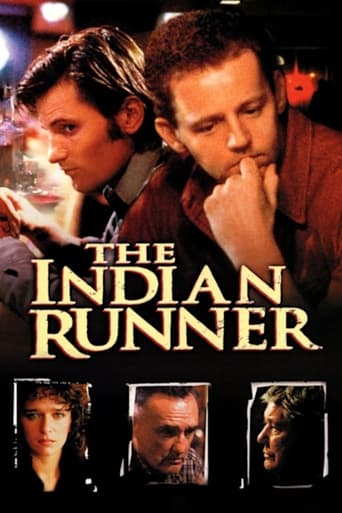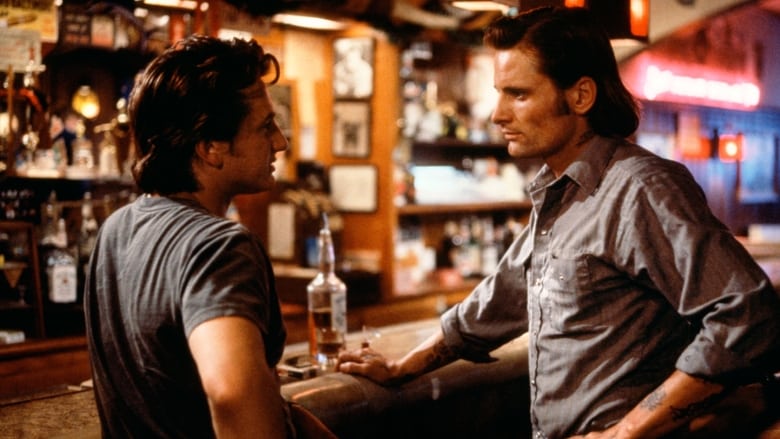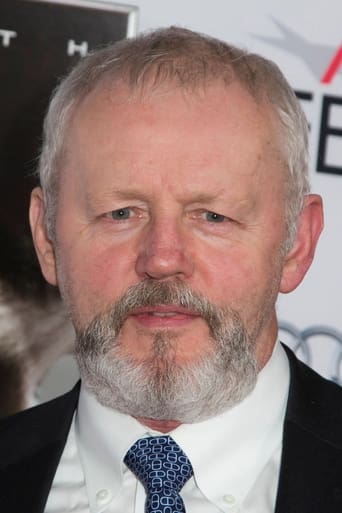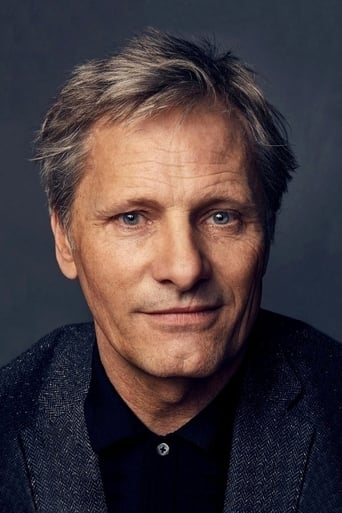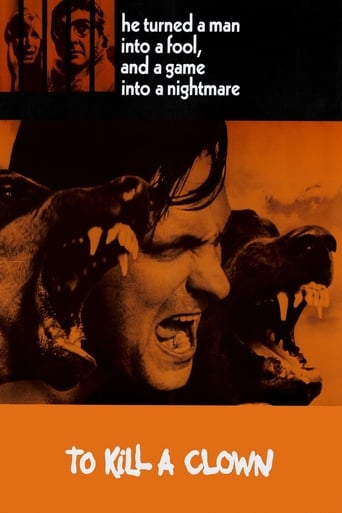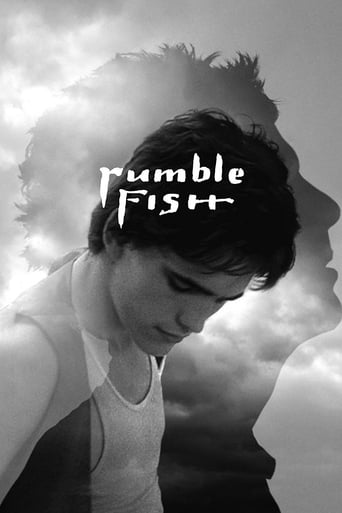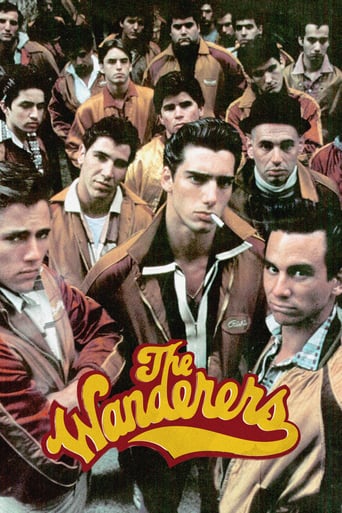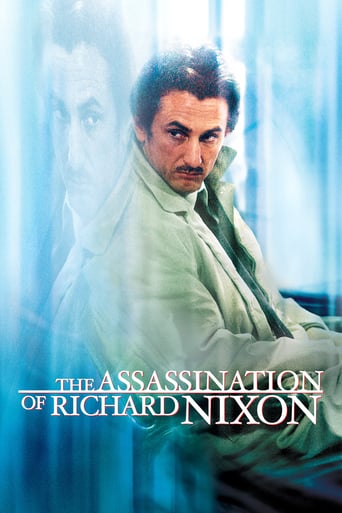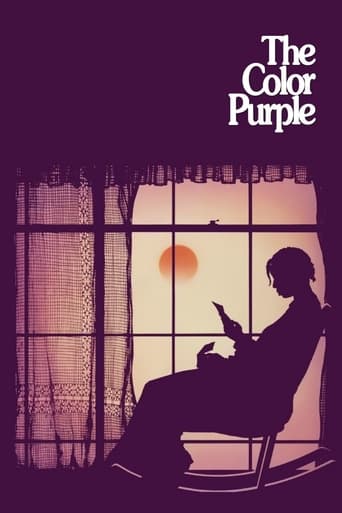The Indian Runner (1991)
Two brothers cannot overcome their opposite perceptions of life. One brother sees and feels bad in everyone and everything, subsequently he is violent, antisocial and unable to appreciate or enjoy the good things which his brother desperately tries to point out to him.
Watch Trailer
Cast


Similar titles
Reviews
Highly Overrated But Still Good
The performances transcend the film's tropes, grounding it in characters that feel more complete than this subgenre often produces.
Good films always raise compelling questions, whether the format is fiction or documentary fact.
There is, somehow, an interesting story here, as well as some good acting. There are also some good scenes
Dear Sean Penn, this is your best film in the role of a writer-director. You got everything right. The film is stylish with some great use of slow motion. The action scene at the beginning of the film was tense and riveting. The film has a great soundtrack including songs by Janis Joplin. The cast which includes Charles Bronson (in a very melancholic role) and Dennis Hopper is stellar. Viggo Mortensen gives the best performance of his career as a violent misfit who cannot seem to get his act together. Patricia Arquette is winsome as his simpleton wife. Mortensen's dialogue about how there is always someone better than you setting new standards, thereby messing up your own attempts to improve resonated with me. David Morse and Valeria Golino are a perfect foil for Mortensen and Arquette's impulsive characters. I am not sure why it is called The Indian Runner. I think it might have something to do with living in an earth alienated culture. The exchange between Frank and Joe about owning farmland and living off it seems to foreground this theme. Joe says "I burned" (when he owned and lived off the land) indicating that he is not entirely happy with his job as a policeman. So that makes this film a prelude to Into The Wild. It was a great directorial debut, Sean. Great work. Best Regards, Pimpin. (10/10)
**WARNING! SPOILERS!** An overall very sad and touching picture. A few over-the-top sad songs are not to my personal liking, apart from that the music score works very well.A police officer, Joe (played by David Morse) tries to do the right thing. He wants to pull his little brother out of a life of crime and help him get back on track. With both their mother and father gone, he really wants to get closer to him. Sadly, his little brother Frank (Viggo Mortensen) is too far gone.I find this movie to be an important reminder that there are people like Frank out there, and just staying away from them is for the best. Some of them, like the Frank character, really want to be left alone. Having a wife and kids is not for them. They are destructive. They will eventually tear down everyone who are involved with them.Mortensen gives a very accurate portrayal of the type of character he plays. Having personally known a few individuals which are very much the same sort (although not being criminals), I can tell his performance is spot-on. Except for a very few moments where he does become emotional, he is very close to being a sociopath. He is violent and abusive towards his girlfriend/wife (Patricia Arquette), a very sweet, naive and innocent character. There are some bright moments. He does attempt an honest living. But he is not content and slips back into his own misery. Sitting in a bar and drinking while his wife is giving birth to their child follows a final confrontation with Joe (and a reminder of how convincing both Morse and Mortensen really are). Despite his best efforts, he's not able to convince Frank to change his ways nor his bleak outlook on life. Finally, Frank crosses the line and there is no way back. The exact psychological reasons for why the bartender (Dennis Hopper) is killed? I don't know, but being a morbid frame of mind doesn't really need an excuse for killing people."I knew I'd never see or hear from Frankie again. He turned his back on himself and his family. I went home that night, watered my garden. Kissed my baby. I held my wife until morning. Life is good...My brother Frank."
Whoever doesn't like this film might not understand the influence behind it. I saw this when it came out in 1991 and thought it was a slow, dull, lagging soap-opera. Back then I didn't know much about the art or the business of film. Most "general" movie watchers would not like this film for the same reasons.Then I watched an interview w/Sean Penn and he said his big influence was John Cassavetes, who had recently passed away. So I went back & watched some of Cassavetes' films again. His films were social dramas between friends, usually in New York, struggling with their own inner conflicts. After that, when I watch Sean Penn's first four films (as filmmaker) I can totally see Cassavetes all over his film. Especially Penn's third film "The Pledge." Never has his inspiration been so strong than in the way Nicholson struggled with his demons. But for people who don't understand this, it's just an average, insignificant movie to them.
Way back in the nineteen-fifties, Neil Sedaka had a song a hit song that told how breaking up is hard to do. As I watched this film, for the first time recently, I wondered whether Sean Penn, the writer/director, had been humming that tune as he wrote the script. That's not meant to be a disparaging question, simply because all ideas have to have a genesis somewhere, and a song actually did inspire this story...Highway Patrol Man from Bruce Springsteen, so I'm told.Thinking about the theme however redolent of the biblical clash between Cain and Abel, perhaps I can't but feel that while Penn might have set out to make a fundamental statement about why some people do bad things, he ended up showing, instead, that a failure to come to terms with the world is merely an indication of immaturity, a failure to leave childhood behind. To that extent, the film succeeds, but it may have been unintentional.The story, as implied, is well recognized: a good brother (Joe, played by David Morse) who is a cop tries to help his younger and wild brother (Frank, played by Viggo Mortensen) overcome his inner demons upon his return from the Vietnam war, in 1963 or thereabouts. Despite all his efforts, Joe is unable to get Frank to change his anti-social behaviour. Eventually, there is a parting of the ways.What makes the film distinctive is, first, the very competent acting by Morse, Mortensen, Valeria Golino as Joe's wife, Maria, and Patricia Arquette as Dorothy, Frank's girlfriend. Second, Sandy Dennis and Charles Bronson appear briefly as the brothers' parents, with both older actors much subdued in their performances as you might expect. Third, the setting is well located in some small towns in Iowa and Nebraska, providing the necessary backdrop for Frank's dislike of settling down into a job, something that he despises. Finally, the script is well-written and rings true for most of the time, I think; in a crucial bar scene between the brothers towards the end, however, when Frank finally explains the essence of his angst, it left this viewer somewhat perplexed. Joe's response is, in a nutshell: Get over it! Me too...Some of the back-story done via old home movies tells us that Frank was a bit of a hooligan anyway and sometimes a violent one; a number of his actions, upon return from the war, bolster that viewpoint. So, psychologically, Frank is a bit of a muddle, but maybe that's Penn's point. And, although, there is no specific reference to the after-effects of Vietnam upon returning soldiers, I cannot help feeling there is an implied message that what happens in the story is not all Frank's fault. But, I could be wrong.However, just how the brothers come to part, finally, forms the multi-layered plot, with all the gruesome violence, coarse language and nudity including a full frontal shot of Mortensen for maybe ten seconds. Not until half-way, does filmdom's favorite crazy, Dennis Hopper, appear as Caesar, a coarse, philosophizing bar-tender to whom Frank takes a dislike, with predictably violent results. And that action sets up the denouement for when Frank must leave: break away from his extended family and make his own way, on his own terms, in an increasingly violent world. In that sequence, Joe finally sees Frank as he really is: a little boy, with two toy guns, ready to fight all-comers. From that perspective, the allusion to The Indian Runner is overblown, because that implies a sense of lost times, a romantic past, an independence of spirit that was noble, more or less. In the context of Frank's psychology however, I think Penn stretched the metaphor way out of proportion to the reality of the action.Unless, of course, Penn's own philosophy is fundamentally nihilistic and hence much like Frank's...Technically, though, the film is well done, with excellent editing and special effects; add to that, a host of old country and western oldies on the sound track, perfectly in keeping with small town America.I very much admire Morse and Mortensen as actors, the latter reminding me of a young Jack Nicholson, while Morse has the size and demeanour of a young Martin Milner. Cinematically, they are a well matched pair for this story, with the physical disparities adding to the emotional and intellectual chasm that separates them forever. It's a sad story, yes, but there is, nevertheless, hope left behind as the tail-lights of Frank's car fade to black.Not recommended for children at all.

